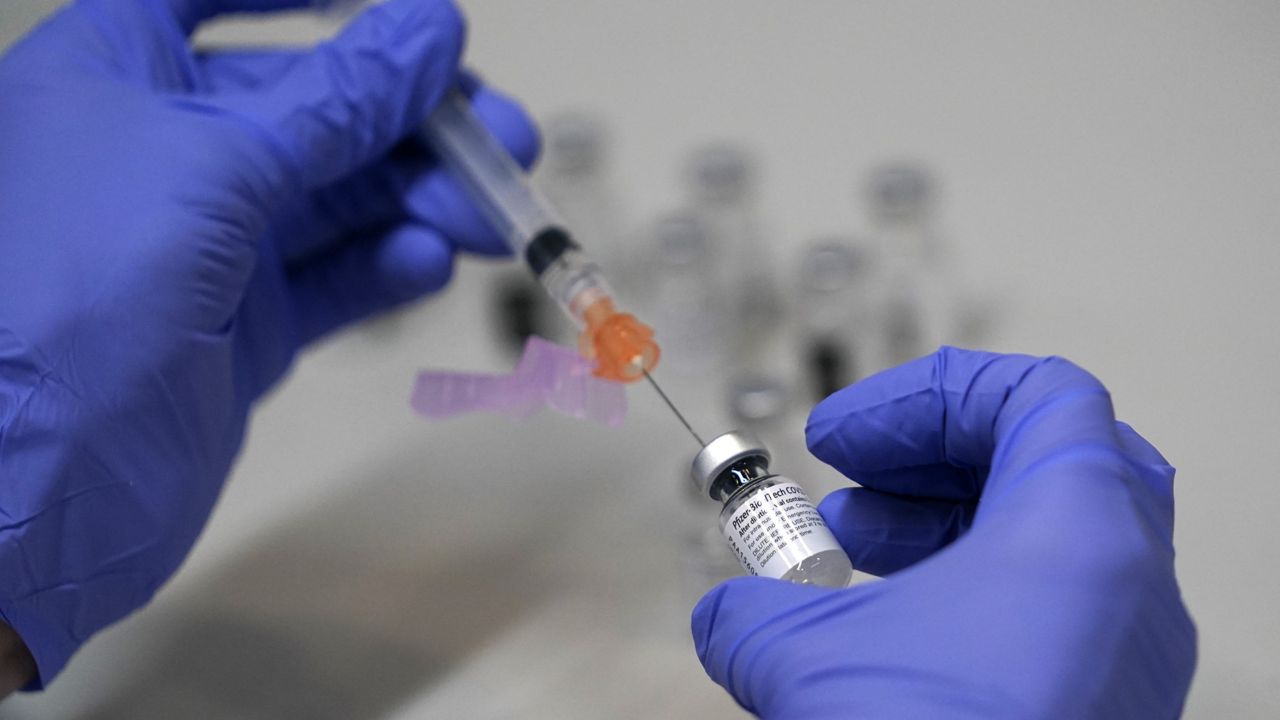Federal health officials are expected to recommend Americans receive COVID-19 vaccine boosters eight months after they got their second dose of the shot, to ensure lasting protection against the coronavirus as the delta variant spreads across the country.
Booster shots could begin as early as mid-to-late September, sources said, with an announcement expected as early as this week.
The news was first reported by the New York Times.
White House press secretary Jen Psaki said at a briefing Tuesday that the White House COVID-19 Response Team and public health officials will "discuss next steps as it relates to boosters" at a briefing Wednesday.
"I would also note for your planning that you do expect to hear from the president on this topic as well following their briefing," Psaki added.
Psaki went on to say that a question of whether to distribute boosters or help other nations “is a false choice," adding: "We can do both. We will continue to be the arsenal for vaccines around the world."
"We also have enough supply, and we have long planned for enough supply, should a booster be needed for the eligible population," Psaki said, noting that she expects federal health experts will address questions of supply on Wednesday.
As for whether President Biden and First Lady Dr. Jill Biden will receive Boosters, Psaki said that "if they are recommended, once a formal announcement or briefing is done, they will certainly plan to follow the guidelines."
Federal health officials have been actively looking at whether extra shots for the vaccinated would be needed as early as this fall, reviewing case numbers in the U.S. as well as the situation in other countries such as Israel, where preliminary studies suggest the vaccine’s protection against serious illness dropped among those vaccinated in January.
The news comes on the heels of federal health regulators last week authorizing an additional dose of the Pfizer-BioNTech or Moderna COVID-19 vaccines for immunocompromised Americans.
Doses would only begin to be administered widely pending authorization from the Food and Drug Administration (FDA). Pfizer and BioNTech announced Monday that they submitted data to the FDA to support a booster shot, noting that the third dose "elicited significantly higher neutralizing antibodies" against the initial strain of COVID-19, as well as the beta and delta variants.
"Vaccination is our most effective means of preventing COVID-19 infection – especially severe disease and hospitalization – and its profound impact on protecting lives is indisputable," Pfizer CEO Albert Bourla said in a statement. "Still, with the continuing threat of the Delta variant and possible emergence of other variants in the future, we must remain vigilant against this highly contagious virus."
"The data we’ve seen to date suggest a third dose of our vaccine elicits antibody levels that significantly exceed those seen after the two-dose primary schedule," Bourla continued.
"This initial data indicate that we may preserve and even exceed the high levels of protection against the wild-type virus and relevant variants using a third dose of our vaccine," BioNTech CEO and founder Ugur Sahin added. "A booster vaccine could help reduce infection and disease rates in people who have previously been vaccinated and better control the spread of virus variants during the coming season."
The director of the National Institutes of Health, Dr. Francis Collins, said Sunday the U.S. could decide in the next couple weeks whether to offer coronavirus booster shots to Americans this fall.
Among the first to receive them could be health care workers, nursing home residents and other older Americans, who were some of the first Americans to be vaccinated once the shots received emergency use authorization from the FDA last December.
Since then, more than 198 million Americans have received at least one dose of a COVID-19 vaccine, according to data from the Centers for Disease Control and Prevention (CDC), with more than 168 million fully vaccinated.
Still, the country is experiencing a fourth surge of virus cases due to the more transmissible delta variant, which is spreading aggressively through unvaccinated communities but is also responsible for an increasing number of so-called “breakthrough infections” of fully vaccinated people.
Israel, which exclusively administered the Pfizer shot, has been offering a coronavirus booster to people over 60 who were already vaccinated more than five months ago in an effort to control its own surge in cases from the delta variant.
For months, officials had said data still indicated that people remain highly protected from COVID-19, including the delta variant, after receiving the two-dose Pfizer or Moderna regimen or the one-shot Johnson & Johnson vaccine. But U.S. health officials made clear Sunday they are preparing for the possibility that the time for boosters may come sooner than later.
“There is a concern that the vaccine may start to wane in its effectiveness,” Collins said. “And delta is a nasty one for us to try to deal with. The combination of those two means we may need boosters, maybe beginning first with health care providers, as well as people in nursing homes, and then gradually moving forward” with others, such as older Americans who were among the first to get vaccinations.
Collins said because the delta variant only started hitting the U.S. hard in July, the “next couple of weeks” of case data will help the U.S. make a decision.
Officials were continuing to collect information as well about the J&J vaccine, which was only approved in the U.S. in late February, to determine when to recommend boosters, one of the officials said.
The White House has said that even though the U.S. has begun sharing more than 110 million vaccine doses with the world, the nation has enough domestic supply to deliver boosters to Americans should they be recommended by health officials.
Global health officials, including the World Health Organization, have called on wealthier and more-vaccinated countries to hold off on booster shots to ensure the supply of first doses for people in the developing world.
The Associated PRESS CONTRIBUTED TO THIS REPORT.



